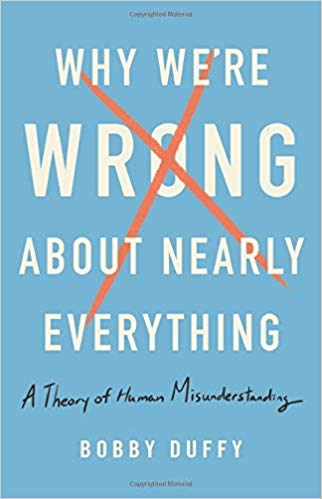You have /5 articles left.
Sign up for a free account or log in.
 Why We're Wrong About Nearly Everything: A Theory of Human Misunderstanding by Bobby Duffy
Why We're Wrong About Nearly Everything: A Theory of Human Misunderstanding by Bobby Duffy
Published in November 2019
Let’s do a quick experiment.
Please write down your answers to the following questions, all of which are discussed in Why We're Wrong About Nearly Everything.
I’ll provide the correct answers, and the average U.S. guess, at the end of this post.
- What percentage of people in the U.S. over 20 are overweight or obese?
- What percentage of Americans age 20 to 79 have diabetes?
- When surveyed, what percentage of people in the U.S. report that they are rather happy or very happy?
- What percentage of U.S. women age 15 to 19 give birth each year?
- What percentage of U.S. adults age 25 to 34 live with their parents?
- What proportion of household wealth in the U.S. do you think that the top 1 percent owns?
- Immigrants make up what percentage of the total U.S. population?
- Out of every 100 people in the U.S., how many are Muslim?
- What percentage of the U.S. will be Muslim in four years’ time?
- What percent of U.S. adults are unemployed and looking for work?
Okay…go and check at the bottom of this blog post. How did you do?
I did well. But, of course, I also took the quiz after reading Why We're Wrong About Nearly Everything. Usually, I’m reliably wrong about most everything.
Some big things that I’ve gotten wrong. Trump. Iraq. Nuclear energy. Genetically modified food.
Imagine how wrong I’m likely to be in believing that OPMs, and other for-profit companies, can be a force for good in higher education. Or my belief that high-priced residential master’s degrees from nonelite universities are likely to disappear, replaced by low-cost online programs designed for scale?
According to Duffy, smart people (including academics) excel at coming up with complicated explanations to support their preconceived biases. Intelligence, unfortunately, seems to offer little defense against motivated reasoning.
Academics, who are experts in their discipline, are likely to assume that their expertise translates into other domains. Knowing a lot about a specialized topic may make us more susceptible to incorrectly believe that we also know a great deal about everything else.
Books like Why We're Wrong About Nearly Everything should be handed out to every first-year Ph.D. student. Understanding our tendency to make judgments that are anchored to our worldviews should cause us all to be more modest in our arguments and assertions.
The comparative advantage that Why We're Wrong About Nearly Everything offers over other books that cover similar ground, such as The Intelligence Trap, is that Duffy introduces a cross-national survey data to his evidence of human misunderstanding. While the book has something of a U.K. focus (lots on Brexit, etc.), I found the comparative country-based explanations of bias to be fascinating.
It turns out that we are all wrong about most everything, but depending on where we live, wrong in different ways.
An entire book about academic illusions deserves to be written. Inside Higher Ed, in its articles and opinion pieces and comments, is full of individuals making confident assertions.
We are mostly confident that we know what we are talking about.
What if we know less than we think?
How did you do on the quiz?
What are your favorite books about our predictable irrationality?
What are you reading?
_____
What percentage of people in the U.S. over 20 are overweight or obese?
Average U.S. guess: 50
Reality: 66
What percentage of Americans age 20 to 79 have diabetes?
Average guess: 34
Reality: 11
When surveyed, what percentage of people in the U.S. report that they are rather happy or very happy?
Average U.S. guess: 49
Reality: 90
What percent of U.S. women age 15 to 19 give birth each year?
Average U.S. guess: 24
Reality: 2.1
What percentage of U.S. adults age 25 to 34 live with their parents?
Average U.S. guess: 34
Reality: 12
What proportion of household wealth in the U.S. do you think that the top 1 percent owns?
Average U.S. guess: 57
Reality: 37
Immigrants make up what percentage of the total U.S. population?
Average U.S. guess: 33
Reality: 14
Out of every 100 people in the U.S., how many are Muslim?
Average U.S. guess: 17
Reality: 1
What percentage of the U.S. will be Muslim in four years’ time?
Average U.S. guess: 23
Reality: 1.1
What percent of U.S. adults are unemployed and looking for work?
Average U.S. guess: 32
Reality: 6




